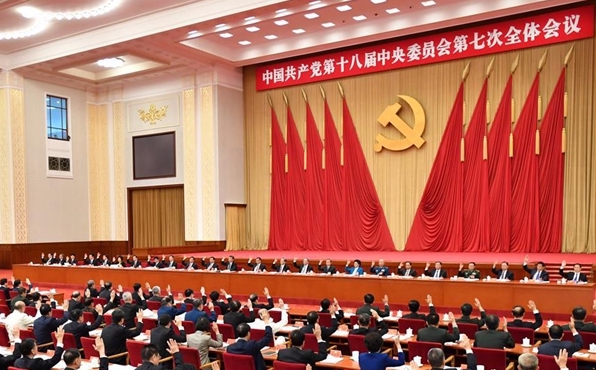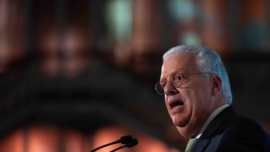From October 28 to 31, the Chinese Communist Party’s Central Committee Fourth Plenum is held in Beijing, having tremendous implications for political positioning and personnel changes that will shape China’s developmental strategy and its policy toward Hong Kong.
First and foremost, President Xi Jinping delivered a work report for the Politburo of the Central Committee on October 28, opening a “new” chapter on China’s governance, according to Xinhua news agency.
China’s governance is characterized by an emphasis on the leadership of the Chinese Communist Party (CCP), an insistence on the people as the centre of value orientations, and an assertion of the importance of ruling the country in accordance with law.
These triple emphases on party leadership, the people and the law mean that the CCP is spearheading the developmental path of the People’s Republic of China (PRC). The ruling party has to care about the people in accordance with the law. The CCP is also expected to improve China’s socialist system and elevate the standards of its governance.
At the same time, people are the central focus of governance, improving the Chinese-style “democratic system.” Finally, the law serves the important functions of stabilizing the reform process, constructing the economy and society, and safeguarding the safety of ordinary citizens.
The political position of the CCP is to persist social, political and legal stability so that the PRC will enjoy longevity, realizing the Chinese “dream” and renaissance.
Second, anti-corruption remains the cornerstone of China’s governance under the leadership of President Xi Jinping and the CCP. On October 21 and 22, the CCP announced that twenty-seven officials were dismissed and investigated on the grounds of corruption and maladministration.
These officials included Li Biao, the deputy mayor of Yunnan province’s Zhaotong city and Li Yong, the vice president of Shandong province’s high court. Other officers of the People’s Liberation Army and also the public security police were purged due to their corrupt activities.
Third, personnel changes are reported in the overseas media that observe China’s political developments. Hu Chunhua and Chen Min’er, two members of the 25-member Politburo, are expected to be promoted to the Politburo Standing Committee. In the mainland media, Hu’s coverage has become extensive, including his recent appointment to chair a committee that deals with poverty issues.
Chen is even regarded by some Hong Kong and foreign media as a potential successor to President Xi in the long run. Yet, given the element of unpredictability in Chinese politics, it is better to observe their performance and developments in a more cautious manner rather than jumping to an early assessment.
Born in 1963, Hu worked in Tibet, Inner Mongolia, Hebei and Guangdong previously, accumulating tremendous valuable experiences and credentials. Born in 1960, Chen has worked in Zhejiang, Guizhou and Chongqing and most importantly was a former vice governor of Zhejiang under the provincial party-secretary Xi Jinping for some time.
Fourth, it was speculated and reported that the Fourth Plenum may lead to personnel changes in Beijing’s policy toward Hong Kong. Since his meeting with Hong Kong business and political elites in Shenzhen on August 7, the director of the PRC State Council’s Hong Kong and Macau Affairs Office (HKMAO), Zhang Xiaoming, has almost disappeared in public, except for an occasion in which he sat on the right hand side of the newly elected Macau Chief Executive Ho Iat-seng who visited Beijing from September 10 to 12.
Interestingly, the director of the Hong Kong Liaison Office, Wang Zhimin, has maintained a very low profile since early August. It has been reported in the overseas and Hong Kong media that both Zhang and Wang would be replaced soon.
If these rumours turn out to be accurate, it would signal Beijing’s displeasure with their handling of Hong Kong matters, especially the extradition bill that triggered huge public opposition and political protests.
It is also rumoured that Wang would be replaced by Chen Dong, the current deputy director of the Liaison Office, or Liang Jianyong, the provincial propaganda director of Fujian province.
Regardless of who would replace Wang, the Hong Kong Liaison Office would have to reflect on the ways in which it has been conducting united front work in Hong Kong because the narrow circle of “friends and followers” that it cultivated has generated considerable public complaints, bitterness and opposition.
Similarly, the HKMAO under Zhang and his predecessor Zhang Dejiang has been adopting a relatively hard-line policy toward Hong Kong, directly or indirectly leading to tremendous public opposition and protests against the extradition bill in 2019.
Fifth, there are also rumours saying that the CCP’s factional politics are shaping the personnel arrangements of the Fourth Plenum. Both Hu Chunhua and Chen Min’er, according to some Hong Kong observers, can be seen as President Xi’s followers and supporters.
Their possible promotion and recruitment into the Politburo Standing Committee would strengthen the Xi Jinping faction, while the so-called Shanghai faction appears to decline in both its influence and membership, especially as the former President Jiang Zeming is ageing.
In March 2018, when the National People’s Congress amended the PRC constitution to abolish the two-term limit for the position of the president, the move triggered the internal opposition from some CCP elders.
President Xi’s protégé, Wang Huning, was the target of criticisms by the party elders, for he was regarded as the architect of the constitutional amendment that augmented the power and influence of Xi. Regardless of all these rumours, President Xi’s position appears to be secure, as evidenced in the October 1 military parade during which he was accompanied by the former leaders Jiang Zemin and Hu Jintao, with the exception of the former Premier Zhu Rongji who reportedly disagrees with Xi’s centralized style of reforms and policy formulation.
Sixth, the Fourth Plenum is held in the midst of the US-China trade war. As such, the emphasis on party leadership is particularly significant because the CCP is going to guide China to the path of economic development even though Washington bargains with Beijing on the trade issues.
Although there are signs that China is facing an economic slowdown, Premier Li Keqiang is going to visit Asian states to strengthen economic cooperation. In other words, the PRC is using its Belt and Road initiatives to maintain and augment its economic space in the midst of the trade war with the US.
Overall, the CCP’s Fourth Plenum is going to consolidate President Xi Jinping’s power base in the short run, set the political tone of the ruling party’s policy agenda and reform directions in the medium term, and most significantly lay the foundation of Xi’s followers, supporters and possible successors in the long run.





















